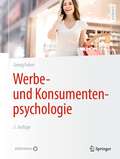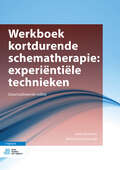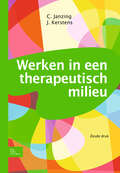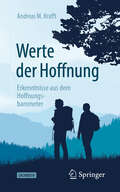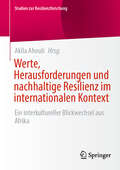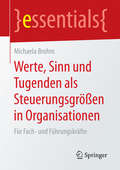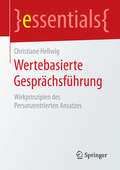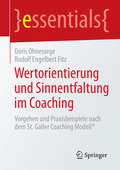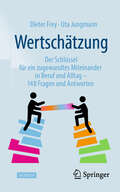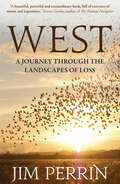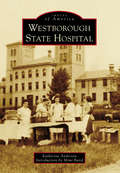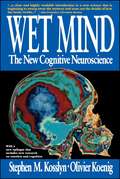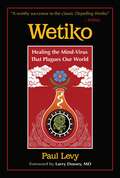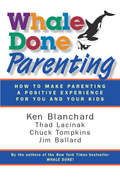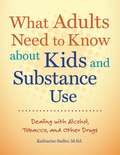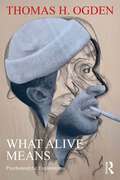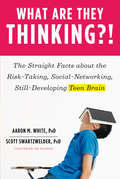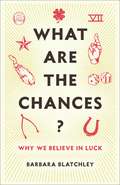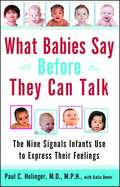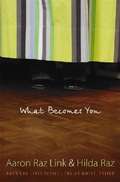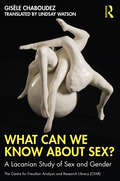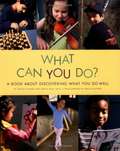- Table View
- List View
Werbe- und Konsumentenpsychologie
by Georg FelserWie funktioniert Werbung? Wie werden Kaufentscheidungen beeinflusst? Wie manipulierbar sind wir als Konsumentinnen und Konsumenten? Welche Methoden im Marketing funktionieren und warum? Das Buch „Werbe- und Konsumentenpsychologie“ gibt Antworten auf diese Fragen. Mit der fünften Auflage des seit Jahren erfolgreichen und prüfungsrelevanten Lehrbuchklassikers halten Sie die psychologischen Grundlagen des Neuromarketings und der Verhaltensökonomie in Ihren Händen. Wussten Sie, dass ein nicht geringer Teil unseres Konsumverhaltens durch automatische, unbewusste und »implizite« Prozesse gesteuert wird? In diesem leicht verständlichen und gleichzeitig wissenschaftlich anspruchsvollen Buch erfahren Sie, welche Rolle diesen Prozessen tatsächlich zukommt. Diese Neuauflage wurde um eine Vielzahl aktueller Forschungsergebnisse sowie neuer Textabschnitte und Kapitel wie z.B. zum digitalen Marketing, Werbung über Influencer, die Bedeutung von Kundenrezensionen, die Folgen des E-Commerce, Online- und Versandhandel und „innovative“ Werbeformen wie z.B. Ambient Marketing oder Native Advertising erweitert.
Werden, wer ich bin: Psychologisches Wissen zur Persönlichkeitsentwicklung
by Cornelia WrzusStimmt es, dass Hans nicht mehr erlernt, was Hänschen nicht gelernt hat? Und wer formt unsere Persönlichkeit stärker – Eltern, Freunde, der Lebenspartner oder doch die Gene? Das Buch präsentiert den aktuellen Stand der internationalen psychologischen Forschung zum Thema Persönlichkeitsentwicklung. Es richtet sich an Menschen mit Interesse an fundiertem Wissen darüber, wie sich Persönlichkeitseigenschaften entwickeln, wobei kein Vorwissen in Psychologie erforderlich ist. Leserinnen und Leser erfahren, wie sich Eigenschaften von Menschen im Durchschnitt im Laufe ihres Lebens verändern, welchen Einfluss Gene und Umwelterfahrungen haben, welche Rolle Lebensereignisse spielen und inwieweit sich Eigenschaften durch Coaching, Therapie und ähnliche Anstrengungen beeinflussen lassen. Realistische und anschauliche Beispiele helfen, hilfreiche Aspekte in den eigenen Alltag zu transportieren. Unterhaltsame Grafiken sowie Podcasts vermitteln Fakten und Befunde in knapper, aufgelockerter Form (Edutainment). Geschrieben für … alle, die sich für Persönlichkeitsentwicklung interessieren – Führungskräfte, Psychotherapeuten, Coaches können mitlesen. Die Autorin: Cornelia Wrzus ist Professorin für Psychologische Alternsforschung an der Ruprecht-Karls-Universität Heidelberg. Sie interessiert sich für Persönlichkeitsentwicklung im Erwachsenenalter und Alter, Persönlichkeit und soziale Beziehungen im Lebensverlauf, Neurotizismus und Stressreaktionen in Alltagssituationen … und dafür, das verständlich zu vermitteln.
Werkboek kortdurende schematherapie: experiëntiële technieken
by Jenny Broersen Michiel van VreeswijkDit werkboek is onderdeel van de behandelmethode Kortdurende schematherapie. Schematherapie is een succesvolle en bewezen effectieve methode voor de behandeling van persoonlijkheidsproblematiek. Gebruikers van dit werkboek krijgen praktische handvatten aangereikt om in therapie bewust te worden van emotionele (problematische) gebeurtenissen in het hier-en-nu en vroeger. Zij leren deze gebeurtenissen te herkennen en ermee om te gaan. Er wordt gewerkt met historische rollenspelen, meerstoelentechniek, imaginatie-oefeningen en beeldende technieken. Iedereen heeft gevoelige snaren. Deze gevoelige snaren, zogeheten schema’s, bepalen hoe mensen in het dagelijks leven functioneren. Triggering van deze schema’s kan iemand in bepaalde gemoedstoestanden (modi) brengen. Sommige mensen ondervinden in hun dagelijks leven zo’n last van hun schema’s en modi dat er sprake is van een persoonlijkheidsstoornis. In deze geactualiseerde editie van dit werkboek ligt het accent op de (therapeutische) relatie en de experiëntiële technieken uit de schematherapie. Het is zowel te gebruiken voor individuele- als groepstherapie. Kortdurende schematherapie bestaat uit een handleiding voor de therapeut, een werkboek CGT-technieken en een werkboek experiëntiële technieken. De werkboeken kunnen los van elkaar worden gebruikt of achtereenvolgend. Beide werkboeken richten zich op het verminderen van de invloed van schema’s en modi op het dagelijks leven van cliënten.
Werken in een therapeutisch milieu: Naar samenhangend behandelen in de GGZ
by C. Janzing J. KerstensIn deze zesde druk van Werken in een therapeutisch milieu ligt het accent op het nastreven van samenhang in de hulpverlening. Het behandelprincipe is daarbij een sleutelbegrip. Dit boek bespreekt het therapeutisch milieu als opzet en organisatie van psychiatrische en psychotherapeutische behandeling. Het geeft aan hoe hulpverleners samenhang in hun bijdragen kunnen nastreven, door vast te houden aan een gekozen behandelprincipe. De eerste delen belichten het therapeutisch milieu en de plaats van de patiënt en de behandelgroep daarin. Vervolgdelen richten zich op de praktijk van groepen, milieutherapeutisch werken en management.Door de vele praktische voorbeelden en oefeningen is Werken in een therapeutisch milieu een toegankelijk leerboek en naslagwerk. Het boek is primair bestemd voor verpleegkundigen en sociaalpedagogisch hulpverleners. Daarnaast is het bruikbaar in diverse opleidingen en als handboek voor hulpverleners en leidinggevenden binnen de Geestelijke Gezondheidszorg in Nederland en Vlaanderen.
Werte der Hoffnung: Erkenntnisse aus dem Hoffnungsbarometer
by Andreas M. KrafftTäglich werden wir über die Medien mit negativen Nachrichten aus aller Welt konfrontiert. Kein Wunder, dass sich viele Menschen Sorgen machen, Ängste entwickeln und pessimistisch in die Zukunft schauen. Dieses Sachbuch berichtet in anschaulicher und überzeugender Weise über die Entstehung und Bedeutung von Weltanschauungen und universellen Werten als eine wichtige Quelle von Hoffnung. Seine Wirkungskraft gewinnt dieses Werk aus der Integration von Theorie und Praxis. Der Leser erfährt über die empirischen Ergebnisse aus dem Hoffnungsbarometer, einer jährlichen, wissenschaftlich breit angelegten Umfrage über die Hoffnungen der Menschen, die in einem philosophischen und psychologischen Gesamtzusammenhang prägnant dargestellt werden. Dadurch findet der Leser Antworten auf zentrale Fragen, die zu einer zukunftsorientierten und durch Zuversicht gekennzeichneten Lebensgestaltung verhelfen können: Welche Hoffnungen, Einstellungen und Werte sind für ein erfülltes und harmonisches Leben förderlich und welche halten den Menschen in einem selbst gebauten Gefängnis fest?Was kann der Einzelne tun, um in einer bedrohlich erscheinenden Welt zu einem Leuchtturm der Hoffnung für sich und andere zu werden? Wie kann die Menschheit aus der Sackgasse von Egoismus, Angst und Konfrontation herausfinden und auf einen Weg des gegenseitigen Verständnisses, der Zuversicht und des Friedens gelangen? Zielgruppen: Alle an Hoffnung interessierten Menschen und alle, die ermutigt in die Zukunft blicken möchten. Zum Autor: Dr. Andreas M. Krafft ist Associate Researcher am Institut für Systemisches Management und Public Governance an der Universität St. Gallen. Als Co-Präsident von swissfuture, der Schweizerischen Vereinigung für Zukunftsforschung, leitet er das internationale Netzwerk des Hoffnungsbarometers. Er ist Vorstandsmitglied des International Hope Institute in den USA.
Werte, Herausforderungen und nachhaltige Resilienz im internationalen Kontext: Ein interkultureller Blickwechsel aus Afrika (Studien zur Resilienzforschung)
by Akila AhouliAls Gegenbegriff zur Verletzbarkeit und Vulnerabilität profiliert sich das Resilienz-Ideal in der Forschung über und aus Afrika oft in Form der Problemlösefähigkeit und adaptiven Bewältigungskompetenz traditioneller Volkskulturen in Prozessen der Modernisierung, der Globalisierung und vor allem gegenüber den damit verbundenen sozio-ökonomischen Fehlentwicklungen, Konflikten und Krisen. Aus dem Blickwinkel der nunmehr über 50 Jahre bestehenden interkulturellen Germanistik in Afrika südlich der Sahara versuchen die im vorliegenden Band gesammelten Beiträge, sich von der im Krisen-Fetischismus quasi gefangen gehaltenen Forschungstradition zu entfernen, um sich mit Werten und Wertebildern auseinanderzusetzen, die Gesellschaften und Wissenschaften für ein positives Resilienzverständnis nachhaltig vorbereiten können. Dabei wird im Band folgenden zentralen Fragen nachgegangen: Welche positiven Werte können für vergangene, gegenwartsbezogene und zukünftige Krisensituationen fruchtbar gemacht werden? Nach welchen strategischen Mitteln werden diese Werte ausgearbeitet und übertragen? Welche Rolle spielt dabei eine afrikanische Germanistik, die sich als interkulturell versteht?
Werte, Sinn und Tugenden als Steuerungsgrößen in Organisationen: Für Fach- und Führungskräfte (essentials)
by Michaela BrohmMichaela Brohm stellt Konzepte und Strategien effektiver, wohlbefindlicher und lukrativer Organisationen vor. Sie erläutert, warum sich integre Führungskräfte mutig, gerecht und menschlich verhalten, und gibt Impulse für die werte- und sinnorientierte Individual- und Organisationsentwicklung. Wertvolle Anregungen, inspirierende Beispiele und ein umfassendes Inventar zu den Strategien werteorientierter Steuerung regen zum Transfer in die Praxis an.
Wertebasierte Gesprächsführung: Wirkprinzipien der Personzentrierten Theorie (essentials)
by Christiane HellwigPraxisnah erläutert die Autorin die grundlegenden Begriffe der Personzentrierten Theorie von Carl Rogers und ihre Bedeutung für eine wertebasierte Gesprächsführung. Auf dieser Basis wird die Relevanz der damit verbundenen humanistischen Haltung vermittelt und dargestellt, wie Menschen darin unterstützt werden können, ihrer Motivation auf die Spur zu kommen. Mit Beispielen aus dem Coaching und dem Führungsalltag wird eingängig beschrieben, wie die personzentrierten Wirkprinzipien dazu beitragen, im wörtlichen Sinn selbst-bewusster zu handeln; sie sind Erfolgsfaktoren und das Fundament wertschätzender Kommunikation. Und sie wirken kontextübergreifend: Sie sind Grundlage für Gespräche in psychosozialen genauso wie in wirtschaftlichen Arbeitsfeldern.
Wertebasierte Gesprächsführung: Wirkprinzipien des Personzentrierten Ansatzes (essentials)
by Christiane HellwigPraxisnah erläutert die Autorin die grundlegenden Begriffe des Personzentrierten Ansatzes und seine Bedeutung für eine wertebasierte Gesprächsführung. Mit der damit verbundenen Haltung werden Menschen darin unterstützt, ihrer Motivation auf die Spur zu kommen und im wörtlichen Sinn selbst-bewusst zu handeln. Die nach dem Personzentrierten Ansatz von Carl Rogers beschriebenen Wirkprinzipien tragen maßgeblich dazu bei und werden hier mit Beispielen aus dem Coaching und dem Führungsalltag eingängig dargestellt. Sie sind Erfolgsfaktoren und das Fundament wertschätzender Kommunikation. Und sie wirken kontextübergreifend: Sie sind Grundlage für Gespräche in psychosozialen genauso wie in wirtschaftlichen Arbeitsfeldern.
Wertorientierung und Sinnentfaltung im Coaching: Vorgehen und Praxisbeispiele nach dem St. Galler Coaching Modell® (essentials)
by Doris Ohnesorge Rudolf Engelbert FitzDoris Ohnesorge und Rudolf E. Fitz positionieren zunächst die These, dass Menschen sich Ziele nicht der Ziele wegen setzen, sondern weil sie Werte vermehren oder Wertverletzungen vermeiden wollen. Aufbauend darauf beschreiben die Autoren, warum und wie Werte im Zusammenhang mit Entwicklungsvorgängen der wesentliche Antrieb für Menschen sind. Diese Wirkung zeigt sich besonders im Kontext Führung, Beratung und Coaching. Werte beinhalten nämlich eine zentrale und starke Dynamik, den Sinn. Erst eine Sinnentfaltung lässt Menschen nicht nur zufrieden, sondern sinnerfüllt leben und arbeiten. Aus dieser Grundüberlegung heraus entstand das St. Galler Coaching Modell®, das auf Werteentwicklung ausgerichtet ist. Ziel der jahrelangen Evaluierung dieses Modells war es, alle entwicklungsrelevanten Elemente in Veränderungsvorgängen zu identifizieren und in ein systemisches und systematisches Modell zu übertragen.
Wertschätzung: Der Schlüssel für ein zugewandtes Miteinander in Beruf und Alltag – 148 Fragen und Antworten
by Dieter Frey Uta JungmannMit Wertschätzung handeln und behandelt werden – das wollen viele. Doch wie kann uns das in Zeiten von Krisen und Konflikten gelingen? Dieter Frey, anerkannter Sozial- und Organisationspsychologe, gibt darauf im Gespräch mit der Journalistin Uta Jungmann zahlreiche Antworten und macht deutlich: Gerade, wenn es schwierig wird, zeigt sich, wie wirkungsvoll Wertschätzung ist – als Kitt, der das Team im Unternehmen zusammenhält und stärkt. Als Bindeglied zwischen Menschen im Alltag, an der Universität, in der Schule oder der Familie. Für ein zugewandtes Miteinander am Arbeitsplatz und in einer von Spaltung bedrohten Gesellschaft. Anhand vieler Beispiele schildert der Psychologe, anschaulich und auf anregende Weise, wie sich mit Wertschätzung ganz konkret Brücken zu anderen Menschen bauen lassen, und mit ihr jeder einen Schlüssel für schwierige Situationen in der Hand hält. – Ein Buch für alle, die sich angesichts zunehmender Polarisierung tiefer mit Wertschätzung befassen möchten und überlegen, wie sie im Beruf gefördert werden kann – damit das Leben und Arbeiten in einer Welt des Umbruchs für alle entspannter wird.
Wertschöpfung hybrid gestalten: Geschäftsmodellentwicklung und Arbeitsgestaltung in der Digitalisierung (ifaa-Edition)
by ifaa – Institut für angewandte Arbeitswissenschaft e. V.In diesem Open-Access-Buch ist die Digitalisierung von Geschäftsmodellen anhand von Praxisbeispielen beschrieben. Dies umfasst einerseits die Entwicklung digitaler bzw. hybrider Geschäftsmodelle und andererseits die Gestaltung des Umsetzungsprozesses im Unternehmen. Dazu zählen Veränderungen an Strukturen der Aufbau- und Ablauforganisation ebenso wie an Zusammenarbeit, Führung und Kompetenzbedarf. Alle Vorgehensweisen und Lösungen sind anschaulich dargestellt. Damit verbundene Potenziale werden ebenso aufgezeigt wie kritische Erfolgsfaktoren.
West: A Journey Through the Landscapes of Loss
by Jim PerrinWest tells the story of Jim Perrin's life against the lives and deaths of his cherished wife and son, and the landscapes through which they traveled together. It is a complex and sensual love story, a celebration of the beauty and redemptive power of wild nature, and an extraordinary account of one man's journey towards the acceptance of devastating personal loss.
Westborough State Hospital (Images of America)
by Katherine AndersonOn the banks of Lake Chauncy sit the remains of the Westborough Insane Hospital, later known as Westborough State Hospital. Westborough is perhaps best known as the second homeopathic hospital for the insane in the United States and the first example of institutional reuse in the nation. The hospital's unique treatment methods put it squarely at the forefront of mental health treatment, and it was one of the last state hospitals in Massachusetts to close its doors. The pioneering African American pathologist Solomon Carter Fuller spent much of his career at Westborough studying the physical changes made to the brain by Alzheimer's. When it closed in 2010, it was the only state hospital in New England with a dedicated unit for deaf and hard of hearing patients. Though somewhat less infamous than some of its neighbors, Westborough holds a very distinctive place in the history of mental health treatment.
Wet Mind
by Stephen M. Kosslyn Olivier KoenigHow do our brains allow us to recognize objects and locate them accurately in space, use mental imagery to remember yesterday's breakfast, read, understand speech, learn to dance, and recall a new telephone number? Recent breakthroughs in brain scanning and computing techniques have allowed researchers to plumb the secrets of the healthy brain's operation; simultaneously, much new information has been learned about the nature and causes of neuropsychological deficits in animals and humans following various sorts of brain damage in different locations. In this first comprehensive, integrated, and accessible overview of recent insights into how the brain gives rise to mental activity, the authors explain the fundamental concepts behind and the key discoveries that draw on neural network computer models, brain scans, and behavioral studies. Drawing on this analysis, the authors also present an intriguing theory of consciousness. In addition, this paperback edition contains an epilogue in which the authors discuss the latest research on emotion and cognition and present new information on working memory.
Wetiko: Healing the Mind-Virus That Plagues Our World
by Paul Levy• Explores how wetiko covertly operates both out in the world and within our minds and how it underlies every form of self-destruction, both individual and collective • Reveals how wetiko&’s power lies in our blindness to it and examines how people across the ages have symbolized wetiko to help see it and heal it • Examines the concept of wetiko as it appears in the teachings of the Kabbalah, Hawaiian Kahuna shamanism, mystical Christianity, and the work of C. G. Jung In its Native American meaning, wetiko is an evil cannibalistic spirit that can take over people&’s minds, leading to selfishness, insatiable greed, and consumption as an end in itself, destructively turning our intrinsic creative genius against our own humanity. Revealing the presence of wetiko in our modern world behind every form of destruction our species is carrying out, both individual and collective, Paul Levy shows how this mind-virus is so embedded in our psyches that it is almost undetectable--and it is our blindness to it that gives wetiko its power. Yet, as Levy reveals in striking detail, by recognizing this highly contagious mind parasite, by seeing wetiko, we can break free from its hold and realize the vast creative powers of the human mind. Levy explores how artists, philosophers, and spiritual traditions across the ages have been creatively symbolizing this deadly pathogen of the psyche so as to help us see it and heal it. He examines the concept of wetiko as it appears in the teachings of the Kabbalah, Hawaiian Kahuna shamanism, Buddhism, and mystical Christianity and through esoteric concepts like egregores, demons, counterfeiting spirits, and psychic vampires. He reveals how visionary thinkers such as C. G. Jung, Sri Aurobindo, Philip K. Dick, Colin Wilson, Nicolas Berdyaev, and Rene Girard each point to wetiko in their own unique and creative way. He explores how the projection of the shadow self--scapegoating--is the underlying psychological mechanism fueling wetiko and examines wetiko in the context of the Covid-19 pandemic, showing that we can reframe the pandemic so as to receive the lessons and opportunities embedded in it. Revealing how the power of imagination can cure the wetiko mind-virus, Levy underscores how important it is for each of us to bring forth the creative spirit within us, which helps shed the light of consciousness on wetiko, taking away its power over us while simultaneously empowering ourselves.
Whale Done Parenting: How to Make Parenting a Positive Experience for You and Your Kids
by Thad Lacinak Chuck Tompkins Ken BlanchardOffers five simple and effective principles for coping with any parenting challenge • Based on actual killer whale training techniques • Story format makes this an unusual and entertaining approach for a parenting book “How is it they can get a killer whale to urinate on cue, and we can’t get our son to pee into the toilet?” Most parents feel frustrated with their children from time to time, but killer whale trainer-in-training Amy Sheldrake has a unique perspective. She marvels at the complex behaviors her superiors are able to coax out of these enormous beasts, while she and her husband struggle to make their beloved – and much smaller – son Josh obey what seem like the simplest rules. What does training killer whales have to do with raising children? As this engrossing and unique parenting fable shows, more than you’d think. In their New York Times bestseller Whale Done, Ken Blanchard and his coauthors – including two veteran marine mammal trainers – showed how positive training concepts used at places like SeaWorld could be adapted to the workplace. In this new book they apply these same principles to parenting. Once Amy and Matt get the hang of the five Whale Done principles, they see a dramatic difference in overcoming challenges like following bedtime routines, dealing with tantrums, introducing new foods, sharing, avoiding overuse of the word no, learning to care for a pet, and instituting time-outs. The foundation of the Whale Done approach is respect. It emphasizes communication and praise rather than obedience and punishment – this is not some Pavlovian primer. Whale Done is much more than a set of techniques; it is a way of looking at people and seeing the best that is in them. Great leaders, saints, and sages have developed this skill. Since most of us are less advanced than those paragons, this book can serve as a guide for how to bring out the best in our children.
What Adults Need To Know About Kids And Substance Use: Dealing With Alcohol, Tobacco, And Other Drugs
by Katharine SadlerPutting a difficult situation in perspective, this hands-on guide explains why youth abuse drugs, how to identify signs of substance abuse, and how to deal with the difficulties of this destructive behavior. This book includes a thorough list of the substances youth are most likely to abuse—including over-the-counter drugs and inhalants—and reproducible handouts that itemize the effects of each drug. Several scenarios are discussed, such as when a student admits to using drugs; when a student says a friend, sibling, or parent uses drugs; when to call a social worker; and when to call law enforcement. Teachers, counselors, and parents can all benefit from the helpful advice in this realistic look at working with kids and drugs in the 21st century.
What Alive Means: Psychoanalytic Explorations
by Thomas H. OgdenInternationally acclaimed for the clarity of his writing and thinking, Ogden radically reconceives psychoanalysis as a therapeutic process in which the patient is helped not only to achieve self‑understanding, but to become more fully oneself.The individual comes to experience life in a way that feels more real, more alive, more personal, more imaginative, and more one’s own. Ogden is concerned with helping the patient reclaim lost life, life that one was not able to experience when it occurred because it was too painful, too confusing, and too dangerous. Ogden pushes the envelope of psychoanalysis as he presents ways in which he rethinks the concepts of the unconscious and analytic time.He expands on what it means to be oneself in an authentic way and how clinical process can help achieve that goal. Building on Ogden’s own highly influential work on the nature of psychoanalysis, this book is essential reading for all psychoanalysts and other readers interested in expanding their understanding of contemporary analytic thinking and clinical practice.
What Are They Thinking?!: The Straight Facts about the Risk-Taking, Social-Networking, Still-Developing Teen Brain
by Scott Swartzwelder Aaron M. WhiteGroundbreaking developments in adolescent brain research underpin this straightforward guide to understanding--and dealing with--teen behavior. Adolescence has long been characterized as the "storm and stress" years, and with recent developments in digital communication, it seems today's teens are in for a more complicated journey than ever before. Even the most sympathetic, "in-touch" parents might throw their hands up in frustration at their teen's unpredictable and risky behavior and ask: what are they thinking?! It turns out that teens' thrill-seeking activities and quests for independence aren't just the result of raging hormones, but rather typical effects of the unique structure and development of the adolescent brain. In easily navigable chapters full of practical anecdotes and examples, acclaimed scientists Aaron White and Scott Swartzwelder draw from the most recent studies on the teen brain to illuminate the complexities of issues such as school, driving, social networking, video games, and mental health in kids whose crucial brain connections are just coming online.
What Are the Chances?: Why We Believe in Luck
by Barbara BlatchleyMost of us, no matter how rational we think we are, have a lucky charm, a good-luck ritual, or some other custom we follow in the hope that it will lead to a good result. Is the idea of luckiness just a way in which we try to impose order on chaos? Do we live in a world of flukes and coincidences, good and bad breaks, with outcomes as random as a roll of the dice—or can our beliefs help change our luck?What Are the Chances? reveals how psychology and neuroscience explain the significance of the idea of luck. Barbara Blatchley explores how people react to random events in a range of circumstances, examining the evidence that the belief in luck helps us cope with a lack of control. She tells the stories of lucky and unlucky people—who won the lottery multiple times, survived seven brushes with death, or found an apparently cursed Neanderthal mummy—as well as the accidental discoveries that fundamentally changed what we know about the brain. Blatchley considers our frequent misunderstanding of randomness, the history of luckiness in different cultures and religions, the surprising benefits of magical thinking, and many other topics. Offering a new view of how the brain handles the unexpected, What Are the Chances? shows why an arguably irrational belief can—fingers crossed—help us as we struggle with an unpredictable world.
What Babies Say Before They Can Talk: The Nine Signals Infants Use to Express Their Feelings
by Dr. Paul HolingerIn What Babies Say Before They Can Talk, psychiatrist and psychoanalyst Paul C. Holinger, M.D., M.P.H., a explains how infants communicate with us, and we with them, and outlines the nine easily identifiable signals that will help you to decode your baby&’s needs and feelings.Dr. Holinger decodes the nine easily identifiable signals—interest, enjoyment, surprise, distress, anger, fear, shame, disgust (a reaction to bad tastes), and dissmell (a reaction to bad smells)—that all babies use to express their needs and wants. These insights will aid parents in discerning what their baby is feeling. This book can help all parents become more confident and self-aware in their interactions with their children, create positive communication, and put the joy back into parenting. This is a unique work. It provides a foundation for understanding feelings and behavior. Based on emerging research, What Babies Say Before They Can Talk offers parents a new perspective on their babies' sense of the world and the people around them. The goal of this book is to help parents enhance their infants' potential, prevent problems, and raise happy, healthy, responsible children.
What Becomes You
by Aaron Raz Link Hilda Raz“Being a man, like being a woman, is something you have to learn,” Aaron Raz Link remarks. Few would know this better than the coauthor of What Becomes You, who began life as a girl named Sarah and twenty-nine years later began life anew as a gay man. Turning from female to male and from teaching scientist to theatre performer, Link documents the extraordinary medical, social, legal, and personal process involved in a complete identity change. Hilda Raz, a well-known feminist writer and teacher, observes the process as both an “astonished” parent and as a professor who has studied gender issues. All these perspectives come into play in this collaborative memoir, which travels between women’s experience and men’s lives, explores the art and science of changing sex, maps uncharted family values, and journeys through a world transformed by surgery, hormones, love, and... clown school. Combining personal experience and critical analysis, the book is an unusual—and unusually fascinating—reflection on gender, sex, and the art of living.
What Can We Know About Sex?: A Lacanian Study of Sex and Gender (The Centre for Freudian Analysis and Research Library (CFAR))
by Gisèle ChaboudezDespite the progress made by psychoanalysis since Freud’s discovery of the sexual nature of the unconscious, analysts have tended to explore psychical causality independently of the role of the biological factors at play in sexuality. What Can We Know About Sex? explains how Lacan’s work allows us to make new links between the sexual laws of discourse, gender and what Freud called the 'biological rock' in human life, allowing a new perspective not only on the history of the sexual couple but on contemporary developments of sexuality in the 21st century. Gisèle Chaboudez’s insights demonstrate that the old phallic logic that has been so dominant is now in the process of being dismantled, opening up the question of how people can relate sexually and what forms of jouissance are at stake for contemporary subjectivity. What Can We Know About Sex? will be a key text for analysts, academics and students of feminism, gender and sexuality.
What Can You Do?: A Book About Discovering What You Do Well (Into Reading, Read Aloud Module 10)
by Shelley Rotner Sheila KellyNIMAC-sourced textbook <P><P>What Can You Do? is a book to help children discover their own special talents. Inspired by Dr. Howard Gardner's Frames of Mind, in which he outlines seven different kinds of intelligence, the book helps children realize that succes comes in many forms. While one child might excel in mathematics, another might shine as an actor or a painter. The top reader in the class may not be a good skier, and vice versa. The authors hope to offer children and the adults who care for them a chance to think and talk about ways children have met with success or difficulty in using their abilities, and to help them recognize that one ability is not better than another. This understanding will encourage children to seek help with their challenges and to delight in their strengths.
